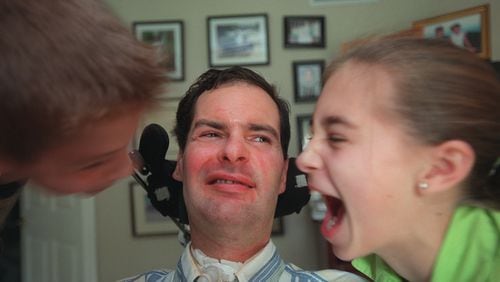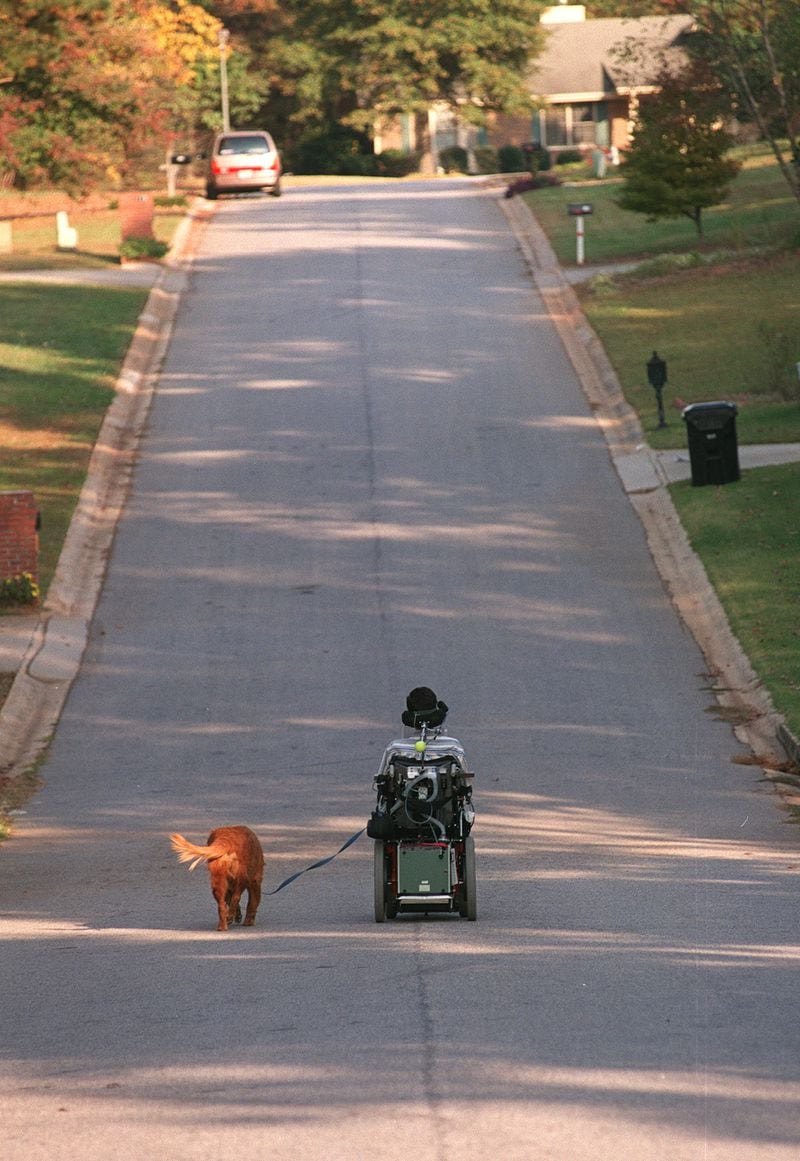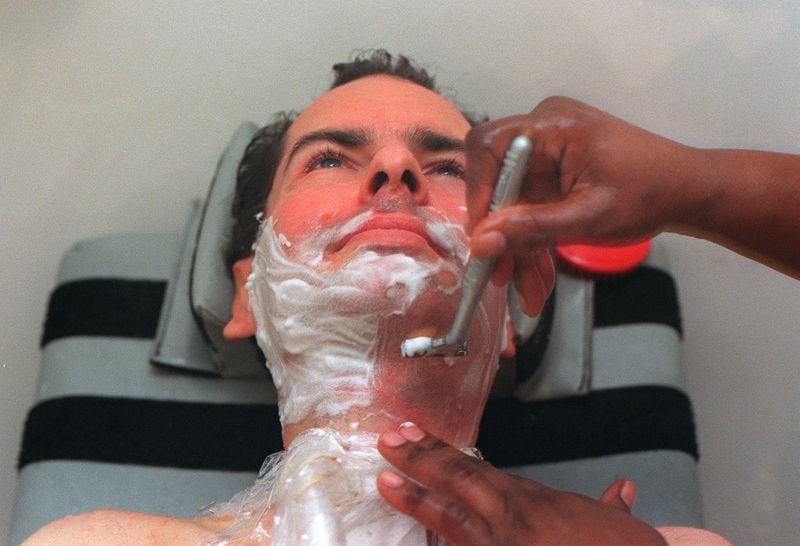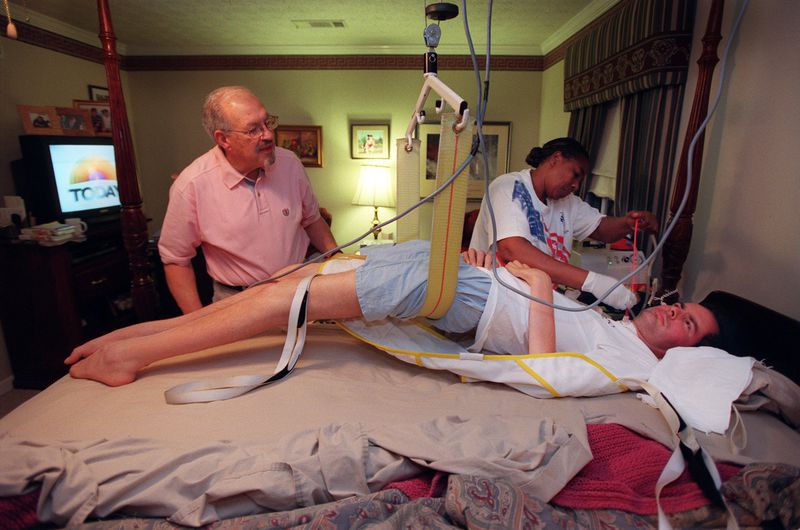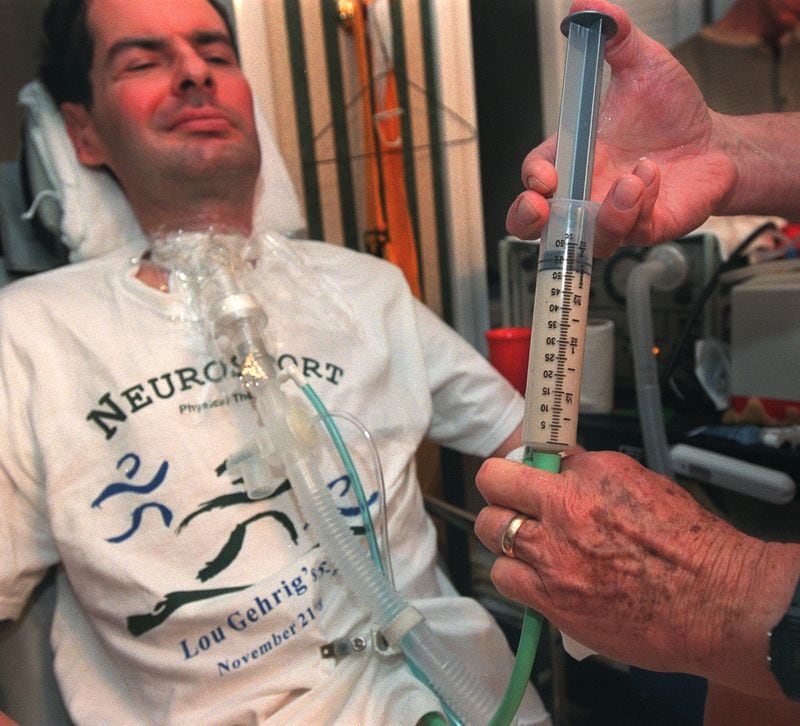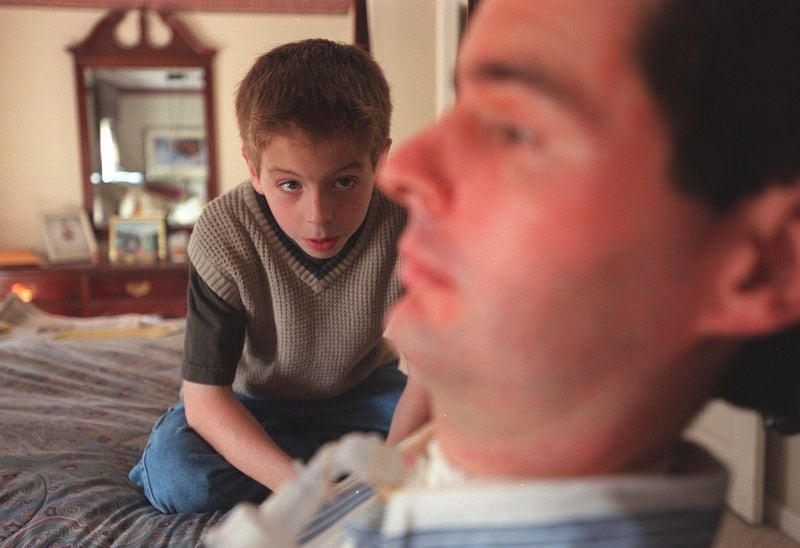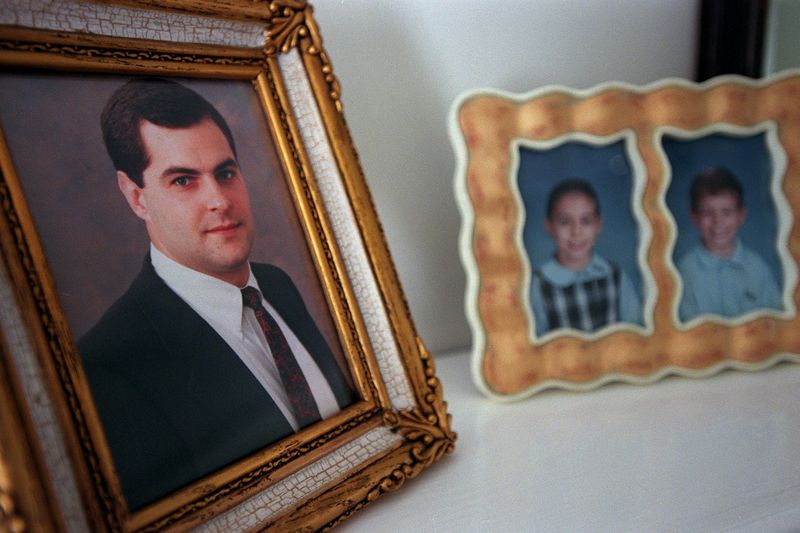NOTE: This article originally published on Nov. 26, 2000 in The Atlanta Journal-Constitution.
The Alaskan morning air is crisp. Each breath invigorating. The stream swirling around his waders is numbing.
Sunlight twinkling across the current makes sunglasses a must: A fly fisherman must cast to the precise spot.
The young stockbroker stands at ease but extraordinarily aware. Suddenly, the rod jerks. It feels like a sockeye salmon, maybe a 10-pounder. He locks in, ready for battle, and then ...
And then he hears his ventilator humming. Every five seconds the device on a cart next to his bed pumps air into his lungs. Poof. Shhhhish. Poof. Shhhhish.
It's another morning and David Jayne is awake, no longer the sturdy fisherman in his dream. A fleeting melancholy dawns on him; it's the opposite feeling of waking from a nightmare.
Credit: RICH ADDICKS
Credit: RICH ADDICKS
Jayne's cheek is deeply creased by a wrinkle from his pillow. His face --- every inch of him, in fact --- has remained in the exact spot since he was tucked away eight hours earlier. He can't move, can't wiggle to a more comfortable spot in the bed. Sleep comes only in patches. Pains and itches are willed away. Often, he repeats, "I'm OK. I'm OK." The mind gets good at conning the body, he says.
Twelve years ago, Jayne would have dismissed this existence as a living hell. But cocksure notions like those died along with his neuromuscular system.
Across from his bed is a photo of the young man in the stream, proudly hoisting a salmon. The room is neat, the walls decorated with family photos and floral wallpaper border. Two armchairs sit near the bed to accommodate visitors.
It's still dark outside but the day is here. There are things to do. Some days, like today, there's a speech or an appearance to make. Other days, he shares time with his children, Hannah, 12, and Hunter, 10. Or just rolls outside and soaks in the sun. He remains an outdoorsman.
Getting up is a daunting two-hour process. Sometimes it makes him so tired he wants to nap. But he never does.
"Bed is dead," Jayne says, paraphrasing Morrie Schwartz, hero of the best-selling "Tuesdays With Morrie." The book outlines a sportswriter's visits with his old college professor, a man dying of Lou Gehrig's disease, or amyotrophic lateral sclerosis (ALS), the same disease that has laid waste to Jayne.
The start of each day is simple. His middle left finger, Velcro'd to a button that's connected to a computer, turns on the "Today" show. He watches "Today" because he finds it the least liberal of the genre. He doesn't watch a lot of TV, sticking mostly to sports and news.
Rose Delisser, Jayne's live-in caregiver, hears the TV and knows Jayne is awake. Soon, the aroma of frying sausage fills the air. Jayne savors the smell of the sausages but he won't taste them. They will be pureed with scrambled eggs, grits and water and fed directly into his stomach through a tube.
Credit: RICH ADDICKS
Credit: RICH ADDICKS
***
So starts the day for Jayne, 39, who for nearly 13 years has watched his physical being shrivel to three barely twitching fingers, blinking eyes and a grimace that suffices as "No!"
ALS is a degenerative condition that strangles the motor neurons that transmit orders from the brain to the muscles. Muscles wither once the brain stops telling them to move. Once 210 pounds, the 6-foot-3 Jayne is now 130 pounds with smooth, amorphous hands and reed-thin limbs.
Jayne, who lives in Rex, 15 miles south of downtown Atlanta, is an ALS longtimer, a survivor who has watched two or three generations of ALS patients get diagnosed and die. He has cheated death through artificial means, thumbing his nose at a sizable public and medical convention that says "get on with it and die, already." Sometimes he feels selfish for it. It takes lots of effort by a legion of people to keep Jayne alive. Somehow, he must repay their sacrifices.
Once, Jayne aspired to make a fortune in business. Now those ambitions are channeled into helping other ALS patients and educating the public as to what is "quality" in life. Two years ago, when Dr. Jack Kevorkian helped an ALS patient kill himself on national TV, it was people like Jayne whose anger crackled though the Internet and on the airwaves. To Jayne, Kevorkian's message was that some lives are not worth living.
That message often drowned out voices like his own. "Life doesn't make headlines," Jayne complains.
He calls his affliction "the monster" or the "thief," one that steals the ability to walk, speak, swallow and, finally, to breathe.
"It tries to destroy families, marriages, friendships, dreams, one's sanity, finances and even the will to live," he told a misty-eyed prayer group last month at St. James Catholic Church in McDonough, where he attends Mass every week.
He knows all too well of what he speaks.
Jayne referred to Job and said he often asks God about his purpose in life. He has yet to receive a divine answer.
What remains of David Jayne is a keen mind, a fierce stubbornness, a reservoir of memories, a swirl of competing emotions and a need to somehow impact his shrunken world.
He maintains a self-deprecating sense of humor to connect with others, to get them over that wall of uncomfortable pity. He must make them see past the machines and human wreckage to the man he really is.
His lips are permanently pinched together in a frozen mask, so Jayne calls himself "the Tin Man" --- after the rusted and immovable "Wizard of Oz" woodsman stuck in the forest. But no Dorothy will be coming with an oil can to set him free.
Technological advances have allowed people with ALS to live longer and better. Jayne speaks through a computer, slowly typing in words with his left index finger. He may send 20 e-mails a day. He loves seeing visitors, relishes the human contact, but the computer is his lifeline.
But medical advances to halt or even delay the progress of the condition have come painfully slow since the day 61 years ago when a dying Lou Gehrig told a crowd at Yankee Stadium that he considered himself the luckiest man on the face of the earth.
ALS has reduced Jayne to a spectator. Those years of watching have caused him to wonder why others don't savor the small moments of life as he would: like holding a child, crunching leaves underfoot or wolfing a pizza.
He still likes to "walk" his dog, to listen to books on tape and to feel the breeze in his hair. Jayne is almost entirely paralyzed but, unlike quadriplegics, he still has feeling in his body. His daughter likes to tickle him by rubbing the cat against his arm.
Credit: RICH ADDICKS
Credit: RICH ADDICKS
***
In a lilting Jamaican brogue, Rose Delisser asks Jayne if he's ready. He blinks. Yes, he is. She mechanically vibrates his chest, unhooks the air hose connected to his throat and runs nearly a foot of rubber catheter hose down his trachea to suction his bronchial passageways.
ALS patients are usually given three to five years to live. Then they slowly suffocate --- unless they choose to get a breathing apparatus surgically inserted into their trachea.
Jayne had the procedure done nearly three years ago after spending six months in bed, flattened by the lack of oxygen. Only 5 percent to 10 percent of the nation's 30,000 ALS patients ever choose to vent. Once hooked up, a person with ALS can live for years, even decades. But ventilators carry a stigma; a common medical wisdom is that venting prolongs the patient's agony. Jayne said his neurologist dismissed venting early on, saying he would have little quality of life and become a burden to his family.
Jayne feared the finality of his decision, of trapping a lucid mind inside a useless body tethered to a machine. He wanted to keep his options open. "I still wanted some steps in front of me," he said.
Now, there's just one step left: asking to be disconnected from the ventilator.
Jayne's wife, Melissa, disagreed with his decision to vent. She had lived with him for 10 years, raising two small children, as he deteriorated. She had spoon-fed him as two toddlers banged on the bedroom door, crying to get in.
But Jayne said it wasn't time to go. He was still young and wanted to watch his children, then ages 9 and 7, grow. He wanted to be more than a memory to them. He wanted to tell Hunter how to deal with bullies. To watch Hannah play softball. To hear them laugh. To feel them rub their faces against his while they told him about their day.
"I felt selfish for my decision," he says. "But I don't regret it."
The burden for caring for a severely ill person often overwhelms all other aspects of life.
"It's very difficult to maintain a marital relationship through intense caregiving," said Meraida Polak, a nurse who runs the ALS clinic at the Emory Clinic and knows the Jaynes. "Often, if couples continue, they do so as caregiver and patient."
Last March, two years after he went on the ventilator, Melissa left with the children.
Credit: RICH ADDICKS
Credit: RICH ADDICKS
***
A sling placed under Jayne is hooked to the hydraulic lift above his bed and he is hoisted several inches above the mattress. Delisser and Jayne's father, Bill, who often arrives for the morning drill, pivot David midair and slide the swaying human package along a metal track bolted to the ceiling. He is lowered into a wheelchair, and his breathing apparatus follows on a rolling cart.
It takes two people to caravan into the bathroom, where a portable radio is tuned to Kicks 101.5. The singer laments: "I'm just a simple country boy with a simple troubled life."
His wife's departure deeply wounded Jayne, who lives for his children. He descended into an emotional abyss. His untiring will vanished. He spent nights sobbing. He rolled aimlessly through the neighborhood racked with self-pity, unsure whether he wanted to hang on.
But Jayne gradually realized he had become a beacon in the ALS community, admired as a fighter who extolled that joy was still there for the taking. But here he was, thinking that he couldn't continue. He felt like a hypocrite.
It crystallized in his mind that there were still people he could reach. That spark inside him still remained.
Four years ago, Jayne was introduced to Hugo, an ALS patient in California who dwelt on his worthlessness and kept Kevorkian's phone number in his Bible. Julie Scurich, his physical therapist, knew of Jayne through some inspiring Internet postings and asked Jayne to get in touch with her friend.
"In a short period of time (Hugo) stopped crying," Scurich said recently. "Though things were not easy for him, he was from then on able to live one day at a time, appreciate the gifts he still had, and the strength of his spirit was renewed. It was an amazing transformation."
After Hugo's death, Scurich sold his motorized wheelchair and used the money to help pay for Jayne's care. She now runs the ALS Internet list server that Jayne founded.
Jayne started the list server in April 1999, as a place where PALS (people with ALS), caregivers and family members could trade tips, share jokes, find information or just blow off steam. Nearly 500 people are connected to Jayne's site and get a slew of messages e-mailed to them every day.
The Internet, he said, is the difference between living in darkness and light. Jayne feels physically sick when a new lister introduces himself on the site as recently diagnosed. He knows too well what they face.
In late 1987, Jayne felt a twitching in his left arm. Tying fishing flies got cumbersome. One day, the groceries he was placing in the refrigerator crashed to the floor as if he had just let go.
Jayne was 27 and otherwise healthy, just four years out of the University of Georgia and nine years from being senior class president of Forest Park High. He had just bought a house in Decatur and was starting his upward trajectory. He just knew there would be a reasonable explanation for what was happening to him.
After a series of tests, Jayne sat in a small examination room at Emory. The doctor was matter-of-fact: You have ALS.
"It was how I would prefer to be told I was going to die if I just had some idea it was coming," he recalls.
"One of the female interns was visibly shaken by what just took place," he said. "I know this is totally insane, but my first thought after being told I was going to die was I felt sorry for her being upset and having to be in the room."
He left the building on that sunny spring day and noticed people walking, joking, singing along to their car radios. It struck him that his life was ending but the world continued, unnoticing.
A week later he learned he and his wife were going to have a baby.
Credit: RICH ADDICKS
Credit: RICH ADDICKS
***
Delisser pushes Jayne's chair into the shower and washes his hair with a handheld sprayer. She shaves him.
Jayne likes a close shave. His children like his face smooth. There's a discipline to shaving daily. He looks better, feels better. He'll take any advantage he can get.
The children visit two afternoons a week and every other weekend. To them, Dad's condition is normal. Hannah's earliest memory of her dad was of him pulling her in a wagon while he drove a motorized scooter.
She smiles, works and wheedles him to get what she needs. She performs an exaggerated version of his you're-in-trouble grimace and kisses his cheek. Hunter and a pack of boys thunder through the house to play a video game in another room. Jayne savors their jabbering. His mouth curls into a grin.
Jayne lives around the corner from his parents in a house he bought not long after being diagnosed. He lives off Social Security and disability payments from his old job. His mother, Georgia, and father pitch in most days to help care for him.
Medicare also sends someone four mornings a week to help with his shower and other chores. But to qualify for the aid, Jayne must be considered "homebound," leaving the house only for medical appointments or church.
That means he can't go out to give speeches, to attend charity "fun runs" or to travel with college buddies to the recent Georgia-Florida game in Jacksonville. He does anyway. "I'm not going to stop living just to get shower help four times a week," he said.
Bill combs Jayne's hair as his head bobs around. Delisser brushes his teeth. They work in tandem, like a pit crew. Bill pulls on his son's shirt. "I used to do this when he was 6 years old, with his little Catholic school uniform," said Bill, an even-keeled fellow with an easy laugh and an optimistic spirit.
But there's a toll.
"On my worst days I complain about what I retired to, until I catch myself," said Bill. Most days the two hold each other up.
Intensely independent, proud and hardheaded, Jayne often won't tell the truth when asked how he's feeling. Fine, he'll answer, even when he's not. He hates being a sponge off everyone, depending on others for virtually everything. He shudders at the prospect of losing the small twitch of movement in his fingers. He has lost movement in one finger in the past year.
After his wife left, Jayne went before the St. James congregation and asked for its help. It was humbling and he wept as his computer rambled through his pre-written speech.
About 60 people signed up to help him with house chores.
"He's brought a lot of joy into my life. I've gotten more from him than I've given him," said Roger Tyler, a neighbor who sometimes stays with Jayne to give his parents and caregiver a break. "He makes you back up and look at things. I'm thankful I can fluff my pillow at night."
Credit: RICH ADDICKS
Credit: RICH ADDICKS
***
Dressed and fed, Jayne maneuvers his chair outside to his van. The lift pulls him inside and his father drives him to Gwinnett Tech to talk to a class of physical therapy students.
He rolls into the class and is met with rapt, albeit somewhat uncomfortable, attention. Students lean forward with smiles glued to their faces that do not disguise their pity. He describes his affliction and offers advice on how to deal with people like him. Don't shout, he says, he may be an invalid but he's not deaf.
"Most frustrating of all is when people talk to my caregiver as if I was invisible, instead of talking to me," he said. "Please know your patient's illness and treat them with the dignity that they deserve."
The computer's delivery of Jayne's words is stiff and off-kilter. But after a while, the mechanical voice is him.
He tells the class of his love for the outdoors but says he finally had to let fishing go. The class gets gloomy for a moment, until Jayne continues: He couldn't find waders to fit his wheelchair.
The class laughs, a little taken aback. Pity and uncertainty dissipate. The students crowd around Jayne, genuinely interested in learning how he manipulates his computer. He has connected with them.
Jayne smiles. It is a good day.
-------------
ON THE WEB:
The ALS Association: www.alsa.org/
-------------
ALS FACTS
What is ALS?
Amyotrophic lateral sclerosis is a rapidly progressive disease that attacks the nerve cells responsible for controlling voluntary muscles. Eventually, patients lose their strength and ability to move their arms, legs and body. When muscles in the diaphragm and chest wall fail, patients cannot breathe without ventilatory support. Most people with ALS die from respiratory failure, usually within three to five years. About 10 percent of patients survive for 10 years or more.
Who gets ALS?
As many as 30,000 Americans have ALS, and an estimated 5,000 Americans are diagnosed every year. ALS most commonly strikes people ages 40 to 60, men more often than women.
What are the symptoms?
The earliest symptoms may include twitching, cramping or stiffness of muscles; weakness of arm or leg muscles; slurred and nasal speech; or difficulty chewing or swallowing.
What causes ALS?
The cause is not known. Research suggests mutations in a particular gene are associated with some cases of inherited ALS.
How is ALS treated?
No cure has been found. However, the Food and Drug Administration has approved riluzole, a drug that is believed to reduce damage to motor neurons of ALS patients. Clinical trials show riluzole prolongs survival by several months and extends the time before a patient needs ventilation support.
Source: National Institute of Neurological Disorders and Stroke
